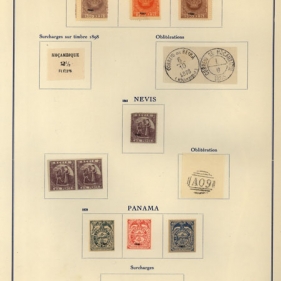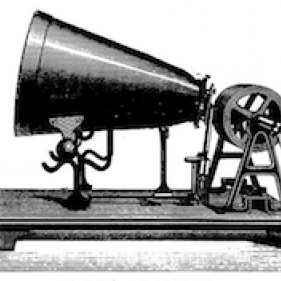Digital Collections related to No name
Primary tabs
Pages
 |
Art & Artist Files in the Smithsonian Libraries' CollectionsThe Smithsonian Libraries' Art and Artist Files are an exceptionally valuable resource for art historical research done on emerging regional and local artists and often are the only obtainable sources of information on those artists. Spread over seven branches, the art and artist files contain information on artists and art collectives, galleries, and museums from around the world, but primarily from North America and Africa. |
 |
Art & Artist Files in the Smithsonian Libraries' CollectionsThe Smithsonian Libraries' Art and Artist Files are an exceptionally valuable resource for art historical research done on emerging regional and local artists and often are the only obtainable sources of information on those artists. Spread over seven branches, the art and artist files contain information on artists and art collectives, galleries, and museums from around the world, but primarily from North America and Africa. |
 |
Art & Artist Files in the Smithsonian Libraries' CollectionsThe Smithsonian Libraries' Art and Artist Files are an exceptionally valuable resource for art historical research done on emerging regional and local artists and often are the only obtainable sources of information on those artists. Spread over seven branches, the art and artist files contain information on artists and art collectives, galleries, and museums from around the world, but primarily from North America and Africa. |
 |
Art & Artist Files in the Smithsonian Libraries' CollectionsThe Smithsonian Libraries' Art and Artist Files are an exceptionally valuable resource for art historical research done on emerging regional and local artists and often are the only obtainable sources of information on those artists. Spread over seven branches, the art and artist files contain information on artists and art collectives, galleries, and museums from around the world, but primarily from North America and Africa. |
 |
Art & Artist Files in the Smithsonian Libraries' CollectionsThe Smithsonian Libraries' Art and Artist Files are an exceptionally valuable resource for art historical research done on emerging regional and local artists and often are the only obtainable sources of information on those artists. Spread over seven branches, the art and artist files contain information on artists and art collectives, galleries, and museums from around the world, but primarily from North America and Africa. |
 |
Art & Artist Files in the Smithsonian Libraries' CollectionsThe Smithsonian Libraries' Art and Artist Files are an exceptionally valuable resource for art historical research done on emerging regional and local artists and often are the only obtainable sources of information on those artists. Spread over seven branches, the art and artist files contain information on artists and art collectives, galleries, and museums from around the world, but primarily from North America and Africa. |
 |
Artists' BooksArtists’ books exist at the intersections of printmaking, photography, poetry, experimental narrative, visual arts, graphic design, and publishing. They have made a place for themselves in the collections of museums, libraries, and private collectors. They have caught the interest of art historians and critics writing about art, and there are numerous studio programs in art schools dedicated to the art of the book, ushering in new generations of artists making books. |
 |
Artists' BooksArtists’ books exist at the intersections of printmaking, photography, poetry, experimental narrative, visual arts, graphic design, and publishing. They have made a place for themselves in the collections of museums, libraries, and private collectors. They have caught the interest of art historians and critics writing about art, and there are numerous studio programs in art schools dedicated to the art of the book, ushering in new generations of artists making books. |
 |
Artists' BooksArtists’ books exist at the intersections of printmaking, photography, poetry, experimental narrative, visual arts, graphic design, and publishing. They have made a place for themselves in the collections of museums, libraries, and private collectors. They have caught the interest of art historians and critics writing about art, and there are numerous studio programs in art schools dedicated to the art of the book, ushering in new generations of artists making books. |
 |
Artists' BooksArtists’ books exist at the intersections of printmaking, photography, poetry, experimental narrative, visual arts, graphic design, and publishing. They have made a place for themselves in the collections of museums, libraries, and private collectors. They have caught the interest of art historians and critics writing about art, and there are numerous studio programs in art schools dedicated to the art of the book, ushering in new generations of artists making books. |
 |
Finding Aid to Postal Files at the NPM LibraryInventory of archival files in the Library of the Smithsonian's National Postal Museum including the Post Office Department files of the Third Assistant Postmaster General; the Panama Canal Zone Post Office collection; the Aerial Mail Service collection; and other USPO department publications. |
 |
Finding Aid to Postal Files at the NPM LibraryInventory of archival files in the Library of the Smithsonian's National Postal Museum including the Post Office Department files of the Third Assistant Postmaster General; the Panama Canal Zone Post Office collection; the Aerial Mail Service collection; and other USPO department publications. |
 |
Finding Aid to Postal Files at the NPM LibraryInventory of archival files in the Library of the Smithsonian's National Postal Museum including the Post Office Department files of the Third Assistant Postmaster General; the Panama Canal Zone Post Office collection; the Aerial Mail Service collection; and other USPO department publications. |
 |
Hirshhorn Museum Library Audio ArchiveThe Hirshhorn Museum Library's Audio Archive is a repository of 306 digital audio files reformatted from audio cassettes ranging in date from 1969 to 2004 containing event recordings and interviews dating back to the founding days of the Hirshhorn Museum and Sculpture Garden. |
 |
Hirshhorn Museum Library Audio ArchiveThe Hirshhorn Museum Library's Audio Archive is a repository of 306 digital audio files reformatted from audio cassettes ranging in date from 1969 to 2004 containing event recordings and interviews dating back to the founding days of the Hirshhorn Museum and Sculpture Garden. |
 |
Hirshhorn Museum Library Audio ArchiveThe Hirshhorn Museum Library's Audio Archive is a repository of 306 digital audio files reformatted from audio cassettes ranging in date from 1969 to 2004 containing event recordings and interviews dating back to the founding days of the Hirshhorn Museum and Sculpture Garden. |
 |
Index AnimaliumSherborn's Index Animalium is a compendium of zoological taxonomic species nomenclature from 1758 to 1850. For each species described in this period it clearly lists the genus name, author, publication, pages, and date. A crucial tool for taxonomists, Index Animalium contains references to over 400,000 names compiled from early taxonomic literature. |
 |
Index AnimaliumSherborn's Index Animalium is a compendium of zoological taxonomic species nomenclature from 1758 to 1850. For each species described in this period it clearly lists the genus name, author, publication, pages, and date. A crucial tool for taxonomists, Index Animalium contains references to over 400,000 names compiled from early taxonomic literature. |
 |
Index AnimaliumSherborn's Index Animalium is a compendium of zoological taxonomic species nomenclature from 1758 to 1850. For each species described in this period it clearly lists the genus name, author, publication, pages, and date. A crucial tool for taxonomists, Index Animalium contains references to over 400,000 names compiled from early taxonomic literature. |
 |
Instruments for ScienceScientific trade literature is a unique and uniquely valuable category of historical evidence. But it has not always been so highly regarded. Being commercial documents, catalogs have traditionally had a hard time fitting into library or archive collections. Even the companies that printed these catalogs expected their usefulness to end as soon as the next edition was printed. That's why so many of them were printed on the cheapest paper available. In many ways it's not surprising that so few of them have survived - or that when they have survived, their existence has gone unnoticed. |
 |
Instruments for ScienceScientific trade literature is a unique and uniquely valuable category of historical evidence. But it has not always been so highly regarded. Being commercial documents, catalogs have traditionally had a hard time fitting into library or archive collections. Even the companies that printed these catalogs expected their usefulness to end as soon as the next edition was printed. That's why so many of them were printed on the cheapest paper available. In many ways it's not surprising that so few of them have survived - or that when they have survived, their existence has gone unnoticed. |
 |
Instruments for ScienceScientific trade literature is a unique and uniquely valuable category of historical evidence. But it has not always been so highly regarded. Being commercial documents, catalogs have traditionally had a hard time fitting into library or archive collections. Even the companies that printed these catalogs expected their usefulness to end as soon as the next edition was printed. That's why so many of them were printed on the cheapest paper available. In many ways it's not surprising that so few of them have survived - or that when they have survived, their existence has gone unnoticed. |
 |
Instruments for ScienceScientific trade literature is a unique and uniquely valuable category of historical evidence. But it has not always been so highly regarded. Being commercial documents, catalogs have traditionally had a hard time fitting into library or archive collections. Even the companies that printed these catalogs expected their usefulness to end as soon as the next edition was printed. That's why so many of them were printed on the cheapest paper available. In many ways it's not surprising that so few of them have survived - or that when they have survived, their existence has gone unnoticed. |
 |
Instruments for ScienceScientific trade literature is a unique and uniquely valuable category of historical evidence. But it has not always been so highly regarded. Being commercial documents, catalogs have traditionally had a hard time fitting into library or archive collections. Even the companies that printed these catalogs expected their usefulness to end as soon as the next edition was printed. That's why so many of them were printed on the cheapest paper available. In many ways it's not surprising that so few of them have survived - or that when they have survived, their existence has gone unnoticed. |
